Guide to Gut Health
Expertly formulated by our in-house nutritionist
Shop Gut Health Range
Here at Lifeplan, our experts understand the importance of looking after your digestive system. We have combined our 20 years of expertise in food supplements with the latest evidence and years of consumer insight to create the Lifeplan Gut Health Range.
Inspired by staged digestive health advice frameworks, our gut health range address a variety of gut health needs and can be taken as part of a whole package of advice about choices you can make to support your gut health.
Why is Gut Health Important
Did you know that gut health affects almost everything in your body? It really is at the core of your wellbeing. It’s essential for the digestion of the foods you eat, releasing important nutrients which it then absorbs, enabling your body to fuel and maintain itself. And with over 100 million nerve endings and its ability to produce 95% of the serotonin in your body, your gut also serves as a communication centre, contributing to how you think and feel.
What’s more, 80% of your body’s natural immune system is in the gut and it is also where your body gets rid of metabolic waste and toxins. So, if your gut is imbalanced, it might be that your immune system isn’t working at its best either, and you may have reduced levels of serotonin, making it more challenging to stay happy and healthy.
The Gut Microbiome
One of the key foundations of your gut health are the trillions of bacteria that live symbiotically in your gastrointestinal tract known as the gut microbiome. Good gut health occurs when you have a healthy gut microbiome, meaning you have a healthy balance of microbes that work well with your body with low or manageable numbers of the types of bacteria or yeast that do not.
Maintaining a positive microbiome diversity is important for your health. Beneficial types of bacteria feed on both soluble and insoluble fibre in our diets, producing new compounds that your body can use that may be beneficial to long term health.
The types of bacteria that do not help your gut health, thrive on components in simple sugars and heavily processed foods. Eating well and caring for your good bacteria is key to good gut health and your overall wellbeing.
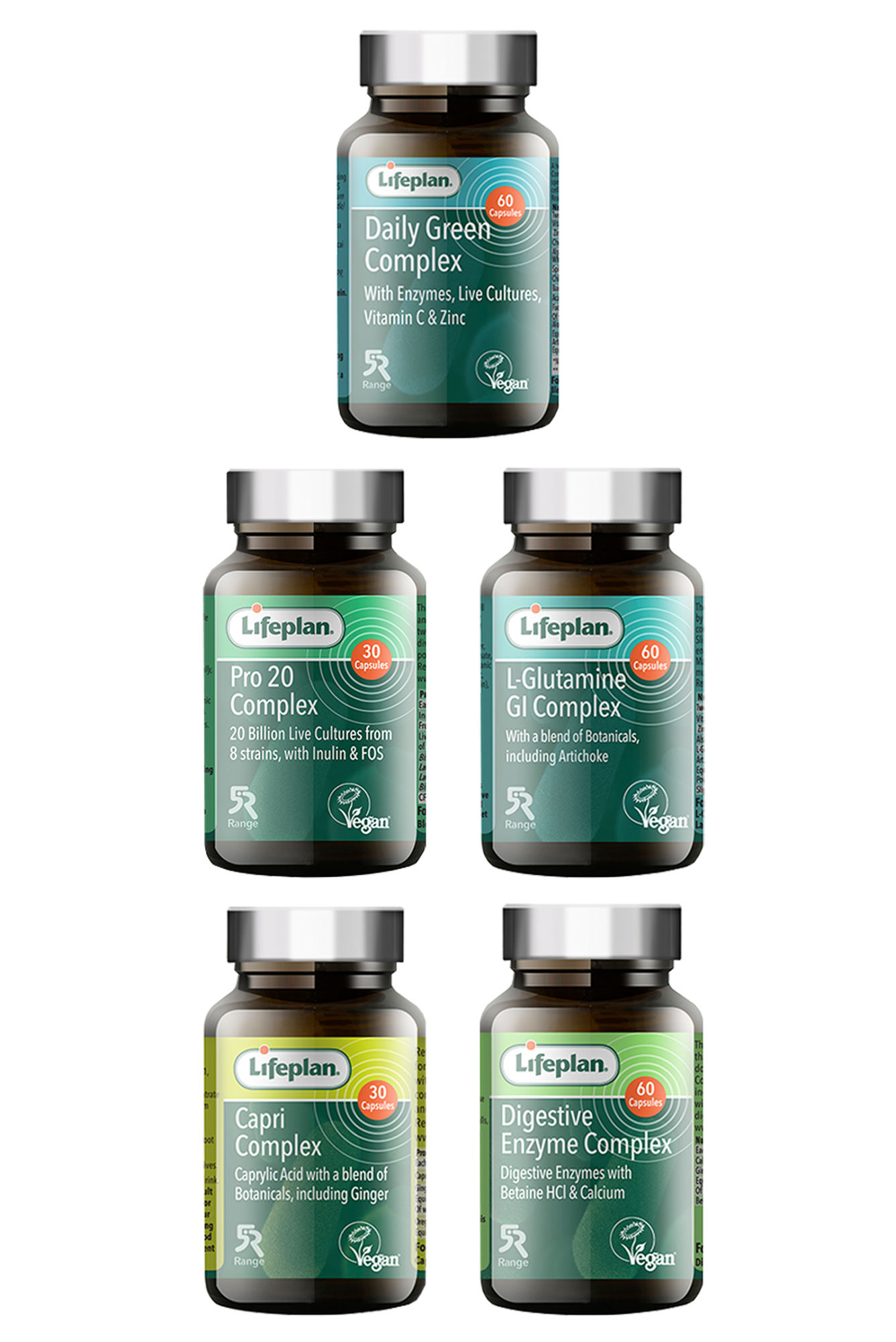
Looking after your gut health takes daily investment. Luckily, this investment is straightforward and easy to keep on track. To support a healthy microbiome, follow these tips for better gut health:

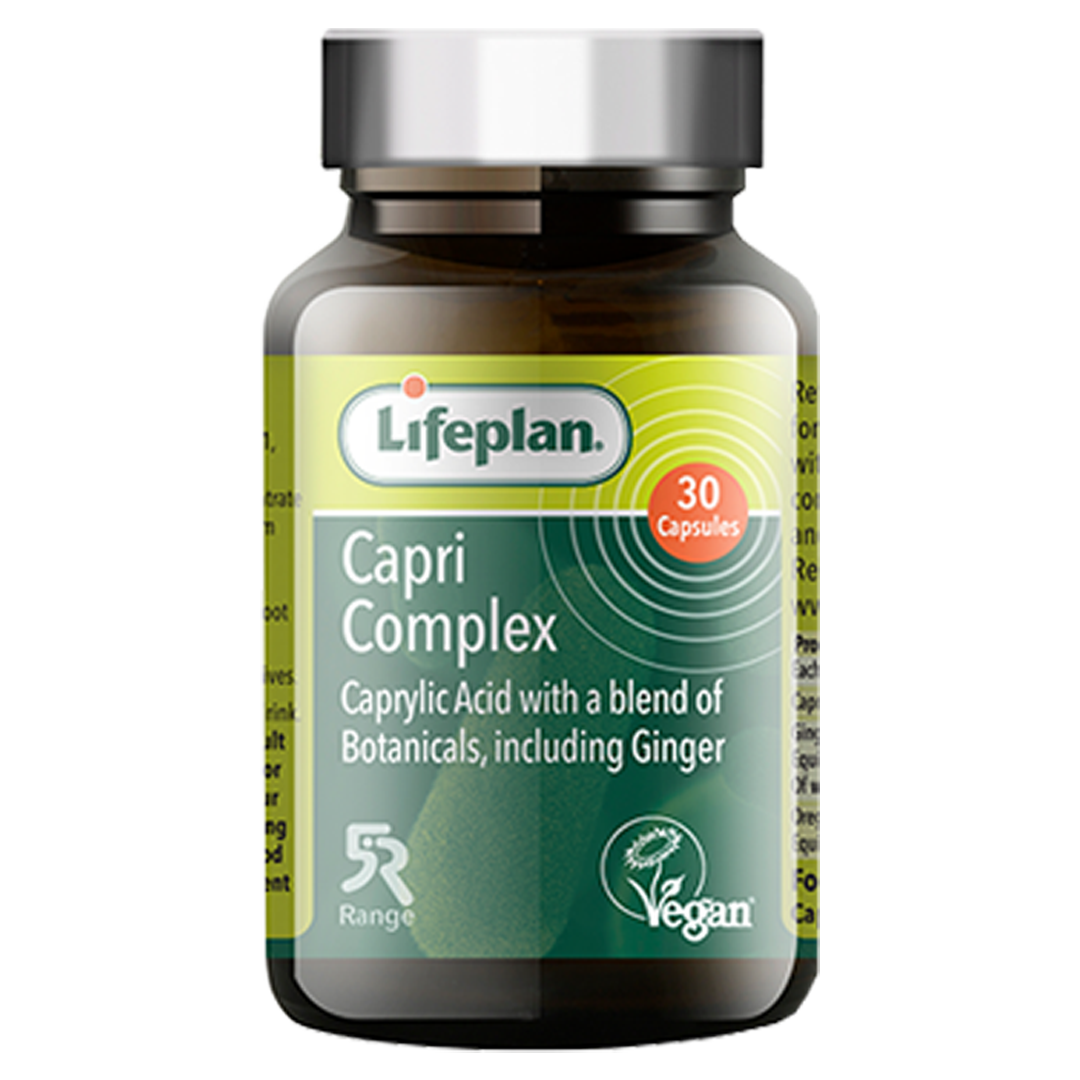
Capri Complex blends Caprylic Acid, derived from Coconuts, plus premium high strength Ginger Root concentrate for your digestion. Boosted with botanicals, Oregano, Thyme, Garlic, Curcumin and Grapefruit Seed. All presented with guaranteed potency.

Coconut Oil contains many fatty acids including Caprylic Acid.

Ginger Root Extract is widely used in supplements and is known to support your digestion and the normal working of the intestinal tract.

Oregano and Thyme are popular herbs used in dishes in the Mediterranean diet and have an aromatic, distinctive smell.

Grapefruit Seed Extract contains an active ingredient, naringin.

Garlic’s distinctive smell comes from allicin, which is thought to be an active component in garlic. Allicin is released when fresh garlic is crushed or damaged.

Turmeric contains the active ingredient curcumin and is known for its distinctive bright yellow colour.
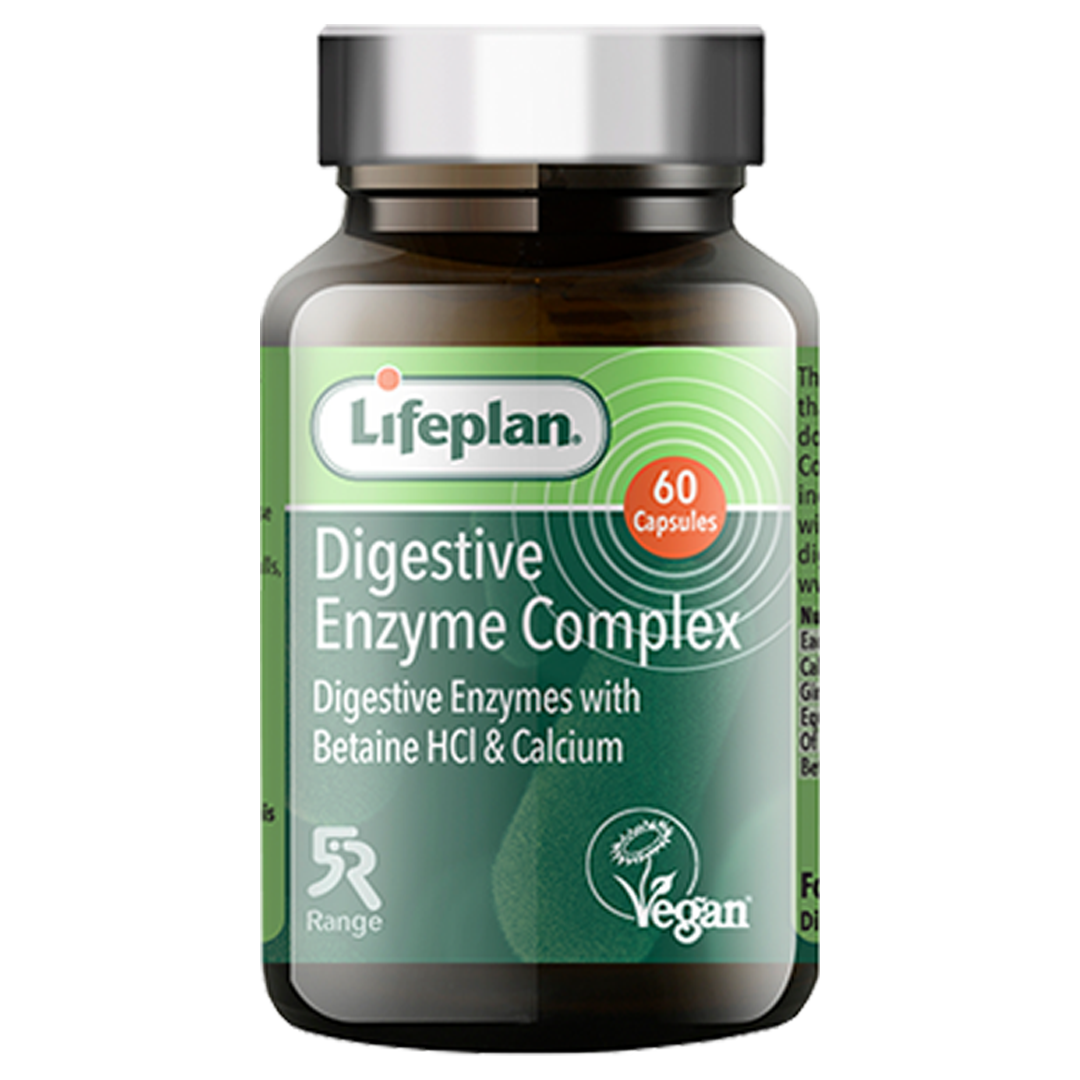
A bespoke blend of seven key digestive enzymes: Lactase, Amylase, Lipase, proteases including naturally sourced Papain and Bromelain plus Cellulase. Boosted with Calcium to help digestive enzymes work as they should, and premium high strength Ginger Root concentrate known to care for your digestion. Digestion describes the breakdown of foods to release the essential nutrients within.
The acidity of the stomach is important for digestive health. Betaine Hydrochloride is an acidic compound and is able to lower the pH of aqueous solutions.
Your body needs enzymes to break down food into smaller pieces. These enzymes are naturally occurring in the body. Enzymes that help break down the major macronutrients carbohydrates, fats and proteins include amylases, lipases and proteases respectively.
Some enzymes break down specific components of food, such as lactase which breaks down lactose, and cellulase which breaks down cellulose. Some foods also contain naturally occurring enzymes, for example papaya contains papain and pineapple contains bromelain.
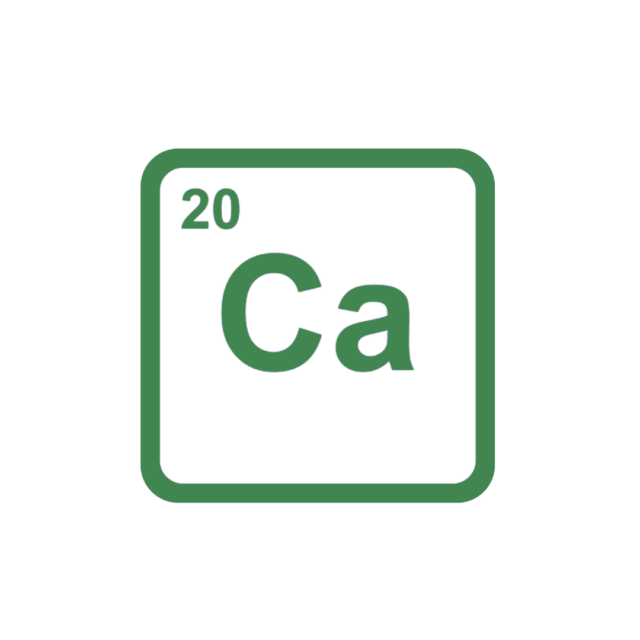
Calcium is a mineral which contributes to the normal function of digestive enzymes.

Ginger Root Extract is widely used in supplements and helps support digestion and the normal function of the intestinal tract.
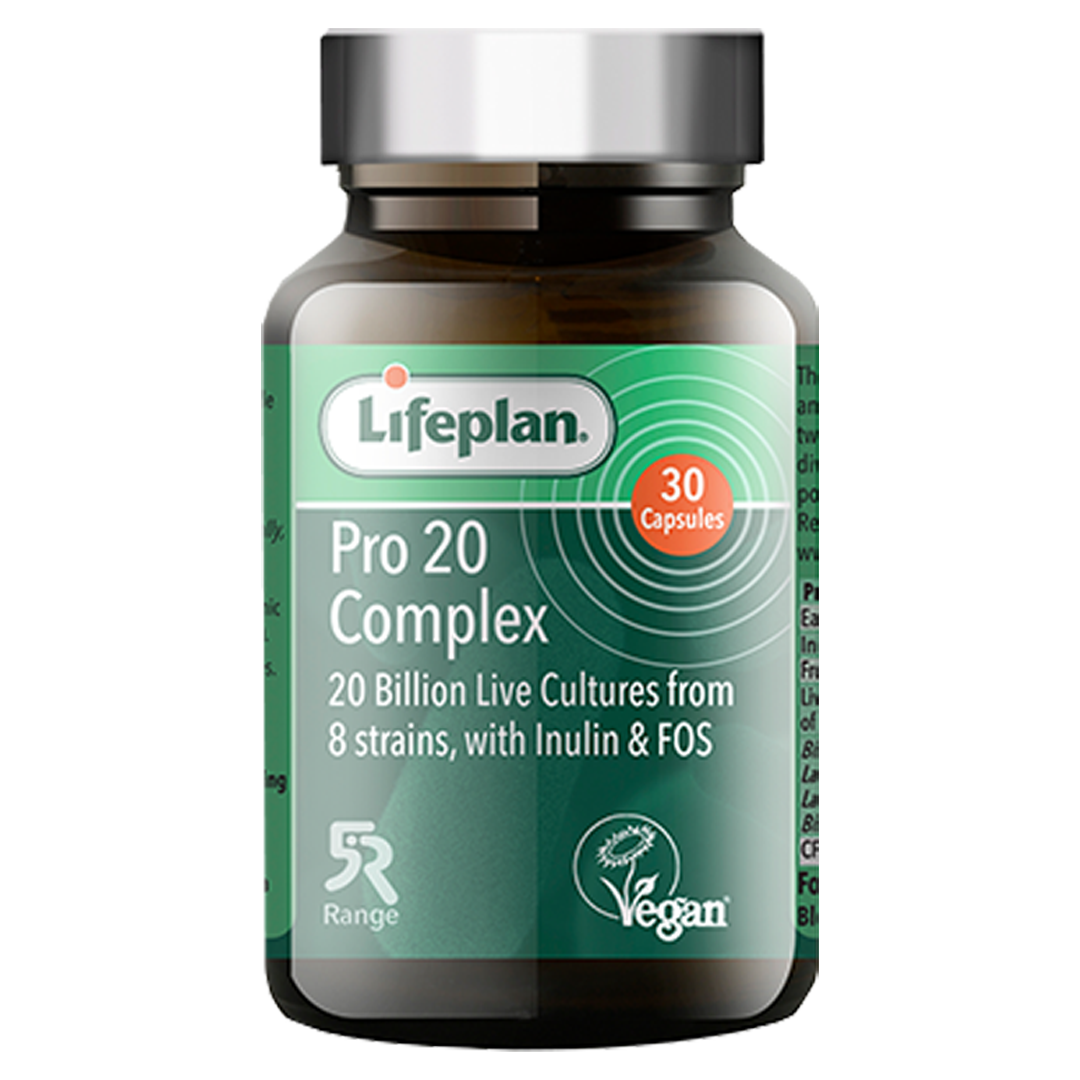
With 20 billion live cultures guaranteed from eight strains of friendly bacteria, this diverse biotic blend comes prepacked with the naturally occurring polysaccharides, inulin and FOS from Chicory Root, both are food sources for the bacterial cultures selected.
The strains of bacteria in Pro 20 Complex are found living in a healthy gut.

Bifidobacteria and Lactobacilli strains reside symbiotically in the gut.

Bacteria in the gut thrive on fibre; inulin and FOS are fibres that the human body cannot digest. Instead of being digested, they travel into the large intestine where the gut microbiome lives
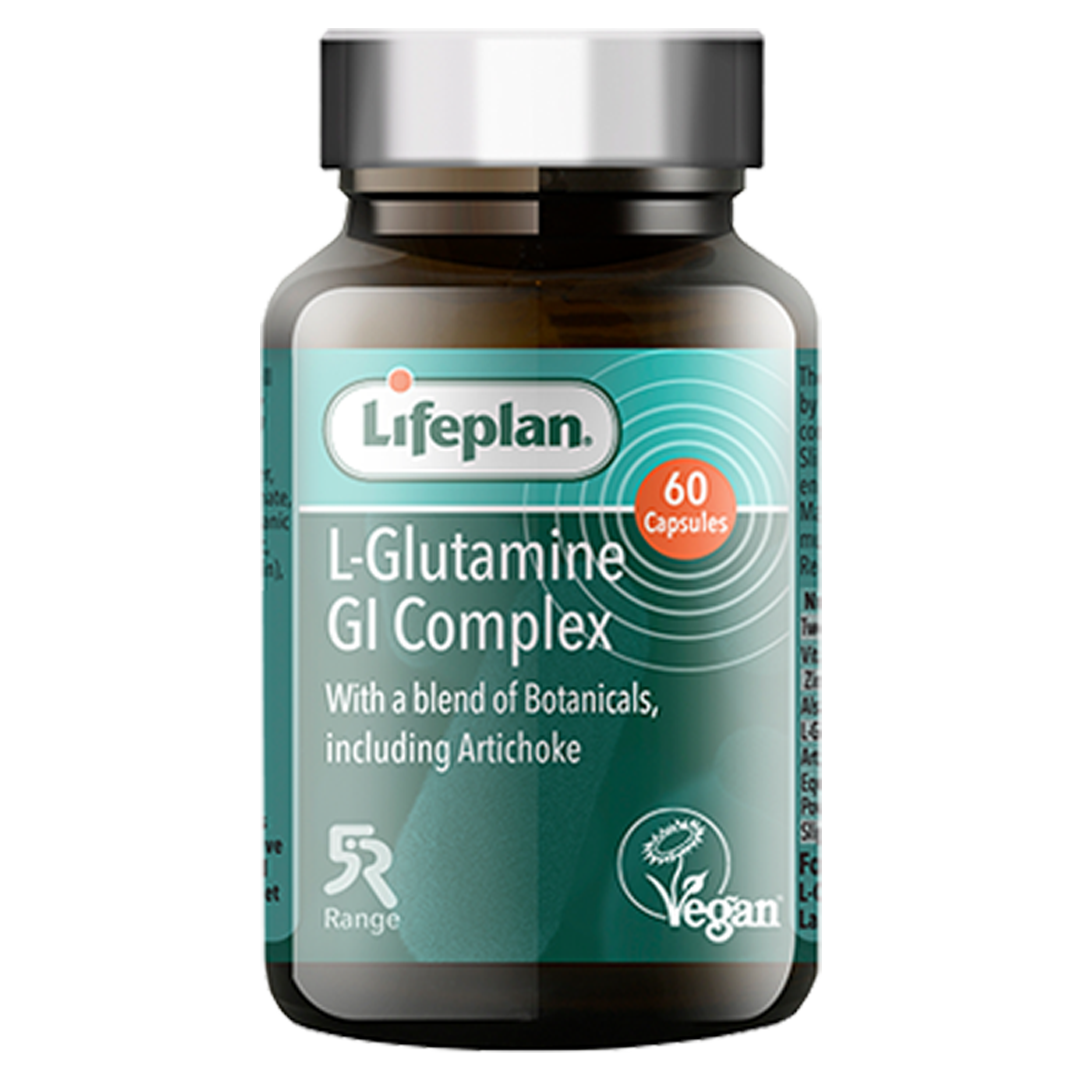
Lifeplan’s L-Glutamine GI Complex contains Artichoke Extract for the normal function of the intestinal tract, and Slippery Elm Powder which helps support the digestive system. The complex is enhanced with Curcumin Extract, Milk Thistle Extract, Psyllium Husk and Marshmallow Root. Vitamin A contributes to the maintenance of normal mucous membranes and Zinc contributes to normal macronutrient metabolism.

L-Glutamine is the most abundant free amino acid in the human body. It is used to make protein structures, and is found in high quantities in intestinal cells.

Artichoke Leaf Extract is a natural source of inulin fibre.

Slippery Elm is a tree native to the central and eastern United States and Ontario, Canada. It has been used in supplements for centuries.

Milk Thistle Extract is a flowering herb native to Mediterranean countries.

Turmeric Root Extract contains the active ingredient curcumin, and is known for its distinctive bright yellow colour.

Marshmallow Root comes from the marshmallow plant and looks like a brown, fibrous husk. The flowers, root, and leaves of the marshmallow plant are edible.

Psyllium Husk is a source of fibre. When psyllium husk comes into contact with water, it swells and forms a gelatin-like-mass.
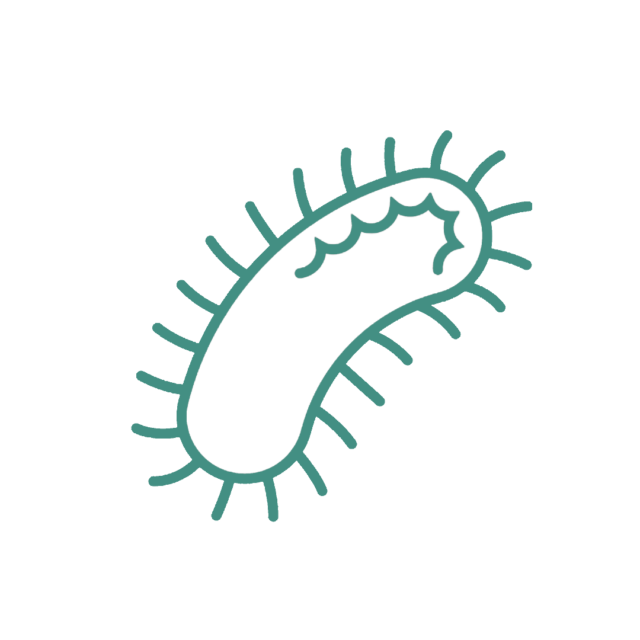
Lactobacillus plantarum is a strain of probiotic bacteria: a class of live microorganisms naturally present in your intestines. It is found in fermented foods like sauerkraut and can be taken as a supplement.
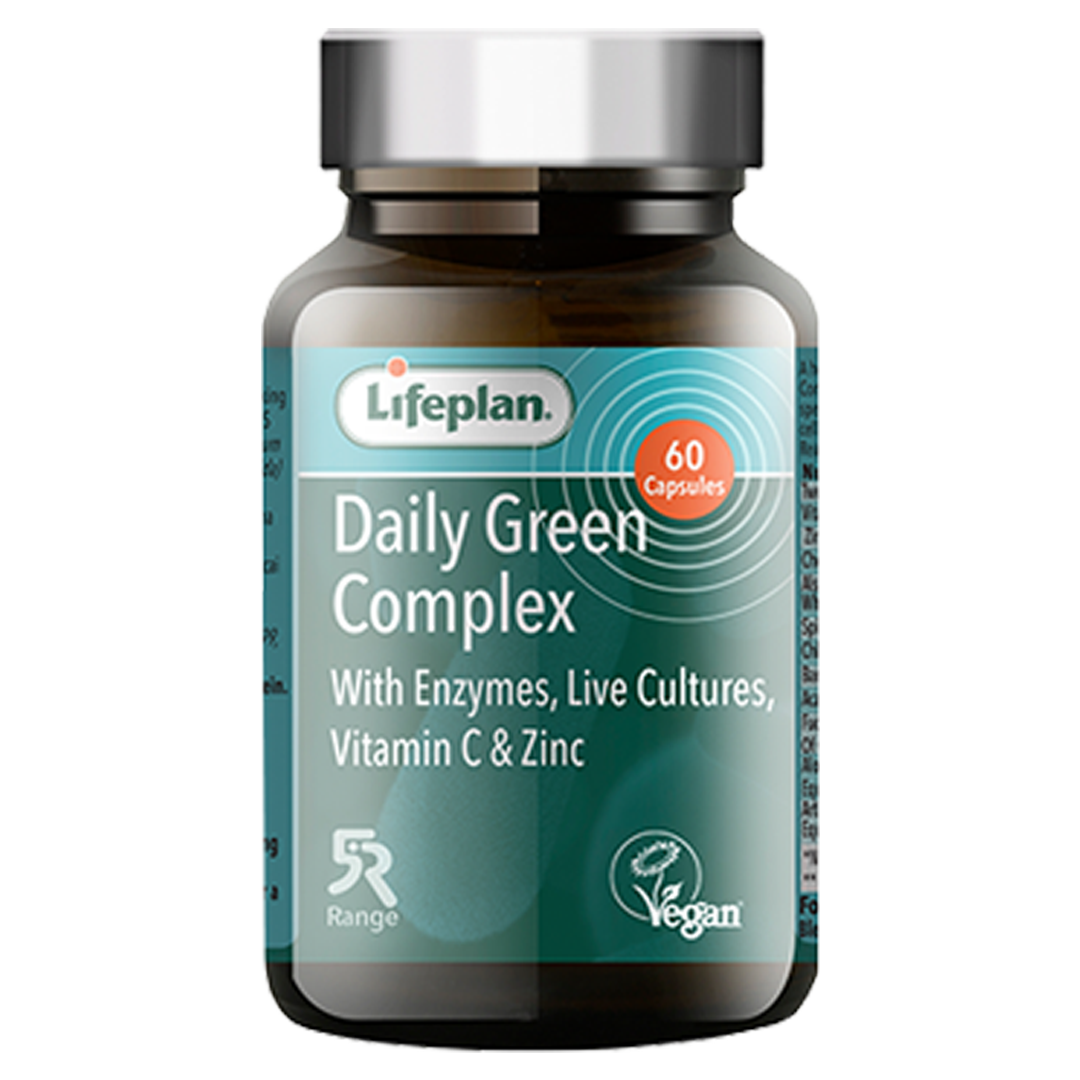
Lifeplan’s Daily Green Complex includes Wheatgrass, Spirulina, Chlorella, Barley Grass and Acai, boosted with a broad spectrum of enzymes and live cultures. Enhanced with Vitamin C which contributes to the protection of cells from oxidative stress and Artichoke Extract which helps support digestion. The cells of your gut are sensitive to oxidative stress. It is important to make lifestyle and dietary choices that contribute to protecting cells from damage.

Vitamin C and Zinc contribute to the protection of cells from oxidative stress.

Barley Grass contains both soluble and insoluble dietary fibre.

Choline Bitartrate provides Choline. Choline contributes to normal lipid metabolism.

Acai comes from the acai palm tree, which is native to Central and South America. The fruit is rich in polyphenols.

Aloe Vera is a succulent plant that can be taken as an extract supplement.

Dandelion Extract from root to flower, dandelions are highly nutritious plants.

Artichoke Extract is obtained from globe artichoke and contributes to the normal function of the intestinal tract. A functioning intestinal tract is important for digestive health and wellbeing.

Burdock Root Powder is high in inulin, a fibre that is metabolised by the gut microflora. It also contains flavonoids and other phytonutrients.

Fucoidan is found in various species of brown algae. It is a long chain sulphated polysaccharide that is broken down by the gut microbiota.

Milk Thistle Extract is a flowering herb native to Mediterranean countries.

Papain, Cellulase, Bromelain, Protease, Lipase and Amylase are digestive enzymes. Digestive enzymes break down nutrients in food and are an important component of the digestive system.

Chlorella is a type of blue-green algae that grows in freshwater.
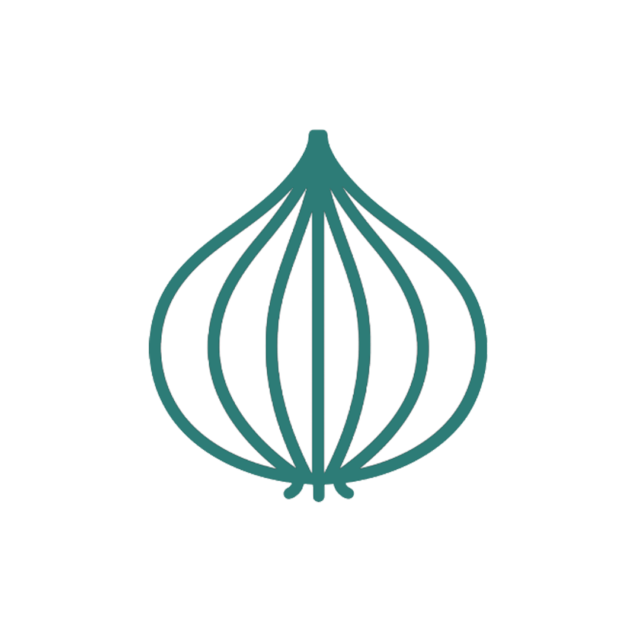
Fructooligosaccharides (FOS) are carbohydrates found in plants including onion, chicory, garlic and asparagus. They are non-digestible by the human body, however they can be fermented down by the gut microflora into short-chain fatty acids.
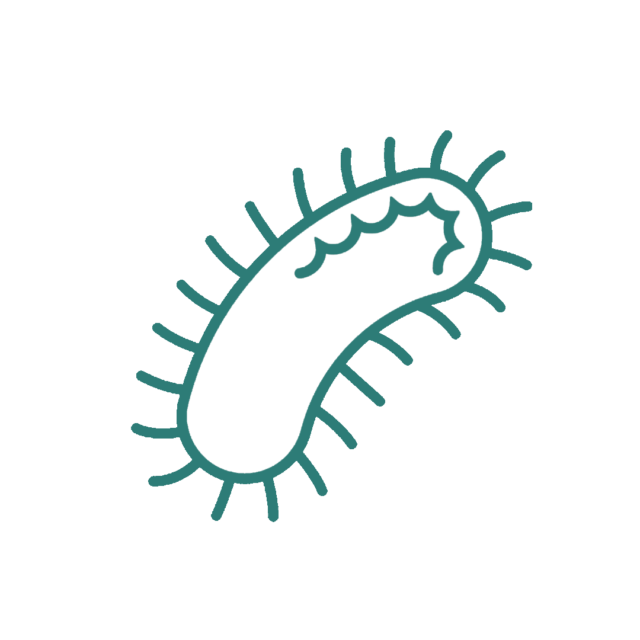
L. acidophilus, B. lactis, L. plantarum, L. rhamnosus, B. breve are strains of bacteria that are found living in a healthy digestive system. They thrive on long-chain polysaccharides and indigestible fibres, breaking them down into short-chain fatty acids.
Join our Newsletter to receive information on:
T&C’s apply